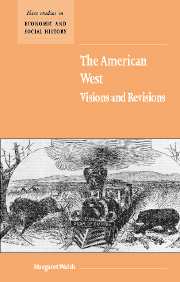Book contents
- Frontmatter
- Contents
- List of maps
- List of tables
- Acknowledgements
- 1 The frontier and the west: realities, myths and the historians
- 2 Land and landscapes: occupation and ownership
- 3 Peoples and migrations
- 4 Making a living: early settlements and farming
- 5 Making a living: non-farming occupations
- 6 Western communities
- Epilogue
- References
- Index
- More Titles in the New Studies in Economic and Social History Series
Epilogue
Published online by Cambridge University Press: 05 June 2012
- Frontmatter
- Contents
- List of maps
- List of tables
- Acknowledgements
- 1 The frontier and the west: realities, myths and the historians
- 2 Land and landscapes: occupation and ownership
- 3 Peoples and migrations
- 4 Making a living: early settlements and farming
- 5 Making a living: non-farming occupations
- 6 Western communities
- Epilogue
- References
- Index
- More Titles in the New Studies in Economic and Social History Series
Summary
A selection of western communities from the vast range of historical possibilities points to the ways in which the narratives of the American west have become diverse in the past quarter of a century. When The American Frontier Revisited was published in 1981 (Walsh, 1981), it was relatively straightforward to survey the findings and discuss the debates about the history and impact of the American west. Then the field was still dominated by the Turnerian approach, whether in its traditional format as expressed by the Old Western Historians or in its revised format as tested by behavioural scientists. Since the advent of the New Western Historians and the arrival of the post-revisionists, the west has fragmented into a kaleidoscope of shapes and colours. There is no longer a dominant framework or even major frameworks; nor is there any desire to have an overarching organising thesis. Diversity is not only acceptable; it is desirable because it is inclusive rather than exclusive.
The American West: Visions and Revisions reflects many of the recent trends in cultural and demographic diversity, environmental awareness, the ranking of regional over national considerations and the flexibility of chronological borders. But it has not discarded the traditional concepts of frontier, conquest and process. Some of Turner's ideas continue to have value, if used in the open-ended way that he intended. They can still raise questions about the past of the American west, as for example, the dominant westward movement and linkages between the centre and periphery.
- Type
- Chapter
- Information
- The American West. Visions and Revisions , pp. 136 - 137Publisher: Cambridge University PressPrint publication year: 2004

